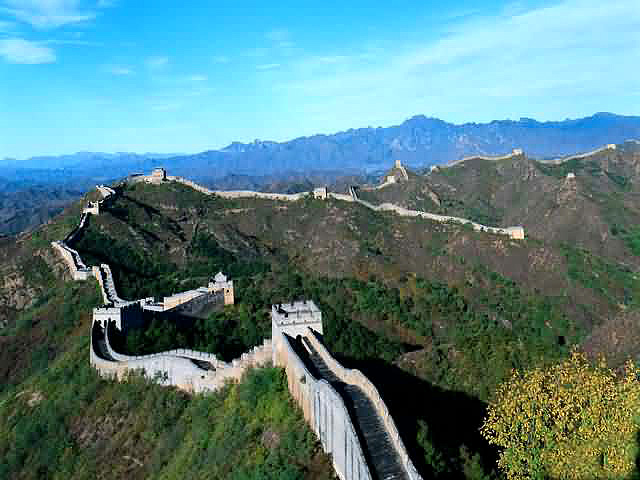Local Beijing Tours
Tour Tips
Ming Tombs ( Ming Dynasty Imperial Tombs)
The Ming Tombs, located 50 kilometers northwest of Beijing proper, is a typical example of Chinese emperors' mausoleums and the best testimony of China's long history and civilization.
They lie in a broad valley to the south of Tianshou Mountain (Longevity of Heaven) in Changping District. To the southwest of this valley, a branch of the Yanshan Mountains suddenly breaks off and forms a natural gateway to the 40-square-km basin in which the tombs were built. They are known as the 13 Ming tombs (in Chinese "Shisanling"), as 13 out of the 16 Ming emperors were buried there. In addition this peaceful valley is the resting place for 23 empresses, one highest-ranking concubine and a dozen immolated imperial concubines.
| Entrance to Dingling Tombs | The huge triple gateway to Ming Tombs |
It was widely held in the Ming dynasty (1368 - 1644) that although dead physically, a person's soul remained, still having human needs. Consequently, the 13 emperors' tomb complexes look like imperial palaces, featuring red walls, yellow tiles, storied buildings and palaces. Under the guidance of traditional Chinese fengshui, the whole process from site selection to designing of the tombs was based on maintaining harmony between tomb architecture and the surrounding mountains, rivers and vegetation, embodying the philosophical view that man is an integral part of nature.
Though varying in size and architectural complexity, these tombs are similar in general layout: each takes an oblong shape with a round or oval Precious Hall at the rear. Each tomb complex starts with a stone bridge, followed by a front gate, a stele pavilion, the Gate of Eminent Favor, the Hall of Eminent Favor, a watchtower and then the Precious Hall. The layout of these Ming Tombs produced a far-reaching impact on the construction of the Eastern Tombs and Western Tombs of the Qing Dynasty (1644-1911). Construction of the Ming tombs started in 1409 and ended with the fall of the Ming Dynasty in 1644. In over 200 years, tombs were built over an area of 40 square kilometers, with walls encircling the entire locale.
Dingling Tomb
Dingling Tomb, also known as the Underground Palace, is the first imperial tomb to have been excavated in China. The tomb owner Emperor Wan Li and two of his wives were buried in 1620 in a deep marble vault located four stories underground (on the hottest of summer days, the vault remains mercifully cool). The entrance to the grounds is marked by a large red gate with a magnificent bronze lion. Gigantic marble doors stand at the entrance to the first of the three burial chambers. Inside are three coffins. Many of these precious finds can be viewed in the two exhibition halls constructed above ground.
Changling Tomb
Among the 13 Ming tombs, the Changling Tomb was the first and largest one built in the area. Its owner, Emperor Zhu Di, is well-known in Chinese history for moving the capital from Nanjing, now the capital of east China's Jiangsu Province, to Beijing. Completed in 1427, this complex took 29 years to complete. Exquisitely built, this tomb features one of the largest halls in China. Huge columns and architecture along the same lines as the grandiose Forbidden City allow the above ground portions of this tomb to cast the emperor 's long shadow even in death.
Select Other Favorite Attractions
| Recommended China Tours with Beijing | ||||||
|
||||||
|
||||||
|
||||||
|
||||||
|
||||||
|
||||||
Guide for China tour, offers most value & amazing experience. In China, you can rely on us
Copyright © 2001 - 2025. All Rights Reserved to ChinaTourGuide.Com
Hotel Guangzhou | Guizhou Tours | Hong Kong Hotels | 香港酒店 | 广州酒店 | 广州会议酒店 | Indochina Tour
Guide for China tours, offers most value & amazing experience. Chinatourguide.com. Your reliable China tour agency.







 More
China Tours
More
China Tours